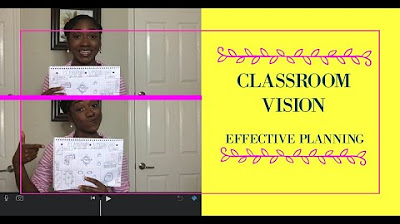Top 5 Tip for Reader's Theater | Classroom Quick Tips
Summary
TLDRIn this video, Beth Cunningham Murray shares practical tips for implementing Reader's Theater in the classroom. She emphasizes the importance of explicit modeling to demonstrate expressive reading, using echo reading to build fluency, and differentiating roles based on student reading levels. The video encourages repeated practice for fluency and confidence, and highlights the joy of performing in front of peers. Lastly, she suggests incorporating props for added fun and creativity. Teacher resources such as Teachers Pay Teachers are recommended for scripts tailored to various reading abilities, making Reader's Theater accessible for all students.
Takeaways
- 😀 Explicit modeling is essential to show students what fluent, expressive reading looks like. Teachers should model by playing multiple roles and demonstrating how to hold the script.
- 😀 Echo reading allows students to repeat lines after the teacher, helping them practice phrasing and expression in a low-pressure environment, especially useful for beginners.
- 😀 Reader's theater helps shy or reserved students feel more comfortable reading aloud by encouraging them to practice in a supportive, non-threatening setting.
- 😀 Differentiating roles based on students' reading levels ensures that all students are appropriately challenged and feel confident with their assignments.
- 😀 Repeated readings of the same script help build fluency. Allow students to rehearse and refine their expressive reading within their groups.
- 😀 Confidence in reading aloud grows as students practice and perform the script in front of the class. This also improves their ability to project their voices.
- 😀 Incorporating fun elements, like props or masks, enhances the performance experience and makes the activity more engaging for students.
- 😀 Readers' theater should be joyful and celebratory. After performances, students should receive positive reinforcement, like applause, to foster a supportive classroom environment.
- 😀 Reader's theater can be integrated into the classroom daily, especially during readers' workshop, to consistently develop students' fluency and reading confidence.
- 😀 If your curriculum doesn’t include reader's theater scripts, resources like Teachers Pay Teachers offer differentiated scripts that can suit varying student reading levels.
Q & A
What is the main benefit of using reader's theater in the classroom?
-Reader's theater helps build fluency, expressive reading skills, and makes the learning process more enjoyable and engaging for students.
Why is explicit modeling important before assigning roles in reader's theater?
-Explicit modeling is crucial because it shows students what expressive and fluent reading sounds like. It also demonstrates how to hold the script correctly while reading.
What is echo reading and how does it help students in reader's theater?
-Echo reading involves the teacher reading a line, and then the students repeating it with the same phrasing and expression. This practice allows students to become more comfortable with expressive reading in a safe and non-threatening environment.
How can echo reading help students who are shy or reserved about reading aloud?
-Echo reading allows students to practice aloud in a supportive setting, mirroring the teacher’s expressions and pacing. This helps them feel more confident and less anxious about reading in front of others.
Why is it important to differentiate roles in reader's theater?
-Differentiating roles ensures that students of varying reading levels can all participate meaningfully. More demanding roles are given to higher-level readers, while simpler roles are assigned to those who need extra support.
How can teachers make sure that all students feel comfortable with their assigned roles in reader's theater?
-Teachers can differentiate roles based on reading abilities, assigning challenging parts to stronger readers and less demanding roles to those who may need more practice. This allows students to grow at their own pace while participating fully.
What role do repeated readings play in developing fluency in reader's theater?
-Repeated readings help reinforce fluent, expressive reading, allowing students to become more familiar with the text. This practice builds both their fluency and confidence in reading aloud.
How does performing the script contribute to building student confidence?
-Performing in front of others gives students the chance to showcase their reading skills, which boosts their self-esteem. It also helps them practice projection and enunciation, making them more comfortable reading aloud in various situations.
What is the significance of adding props or masks during reader's theater performances?
-Allowing students to create simple props or masks adds an element of fun and creativity to their performance. It also enhances the theatrical experience, helping students engage more deeply with the material.
What resources can teachers use if their language arts curriculum does not provide reader's theater scripts?
-Teachers can use resources like Teachers Pay Teachers, where many reader's theater scripts are available, often differentiated for various reading levels, making them easier to implement in the classroom.
Outlines

Cette section est réservée aux utilisateurs payants. Améliorez votre compte pour accéder à cette section.
Améliorer maintenantMindmap

Cette section est réservée aux utilisateurs payants. Améliorez votre compte pour accéder à cette section.
Améliorer maintenantKeywords

Cette section est réservée aux utilisateurs payants. Améliorez votre compte pour accéder à cette section.
Améliorer maintenantHighlights

Cette section est réservée aux utilisateurs payants. Améliorez votre compte pour accéder à cette section.
Améliorer maintenantTranscripts

Cette section est réservée aux utilisateurs payants. Améliorez votre compte pour accéder à cette section.
Améliorer maintenantVoir Plus de Vidéos Connexes

Journalism How-To: Interviewing

Top 10 CLASSROOM MANAGEMENT Tips in 10 Minutes

PLANNING 101: Classroom Vision

My Best Tips for Structuring Capacities- Objects, Collections and Tags

CircularX_2015_5_3_Gwen_Circular_Textiles_Programme_overview

40 soal latihan seni budaya (Seni Teater) beserta jawaban dan pembahasan #RuangBelajarSeniBudaya
5.0 / 5 (0 votes)
